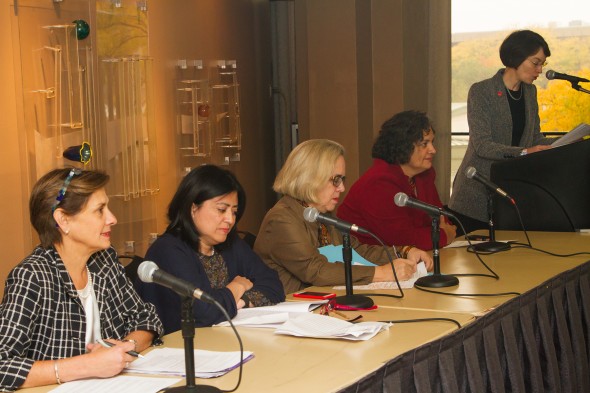Campus Conversation tackles immigration, walls, bridges
Approximately 11 million undocumented immigrants live in the U.S., a panel of experts told the UIC community Nov. 2 during a Campus Conversation series event.
To answer how or why some immigrants don’t have access to legal status, the role of race in American history and policy formation would have to be traced.
“To do that would require a long time,” said Susan Gzesh, executive director for the Pozen Family Center for Human Rights at the University of Chicago. “At least one course.”
But, in an hour, Gzesh and two panelists, Xóchitl Bada, professor of Latin American and Latino Studies at UIC, and Mary Meg McCarthy, executive director of the Heartland Alliance’s National Immigrant Justice Center, explained topics related to the discussion’s focus: immigration, migration, displacement, walls and bridges. Amalia Pallares, director of Latin American and Latino Studies, moderated the panel, asking critical questions about topics such as the pros and cons of detention and deportation, the costs of immigration policies and future trends.
The event, part of a yearlong initiative sponsored by the Office of the Provost, creates a safe space to address pressing issues and provides an opportunity for the university community to engage in constructive dialogue.
Sharing why the topic was important, Bada noted that last year, the foreign-born population of the U.S. was 14 percent of the total population — 45 million people. Fifty-three percent of those people come from Latin American countries and are often seeking asylum.
“These are individuals who are fleeing for their lives,” said McCarthy, who told the audience about the high crime, murder and violence rates in Central America.
“These are our neighbors in our own backyard who are facing horrendous violence…we need to be welcoming to these individuals and providing them with legal protection.”
The panel also talked about how many policies have split families — five million children are currently in the foster care system because their parents have been deported, McCarthy said.
The discussion then shifted to the dissonance between immigration policies and the nation’s economic practices, the abuse of foreign labor workers who migrate legally and the costs or benefits of the United States’ large immigrant populations. Gzesh believes the benefits far outweigh the costs.
“We have tremendous cultural diversity which has improved our…understanding of the world,” she said.
The panelists emphasized that people should participate in civic engagement opportunities that push for immigration reform.
No matter who wins the presidential election, McCarthy said, she thinks “it’s really important that we be ready to mobilize.”
Syeda Raza, a master’s student in education, said it was important for her to learn about the issues so that she can become a better educator. Raza will be attending the final open forum, which will take place from noon to 1 p.m. Wednesday in 302 Student Center East.
“Dialogues are always a good space to engage in conversations that impact so many people,” she said.
Three installments in the Campus Conversation series will be held next semester.

